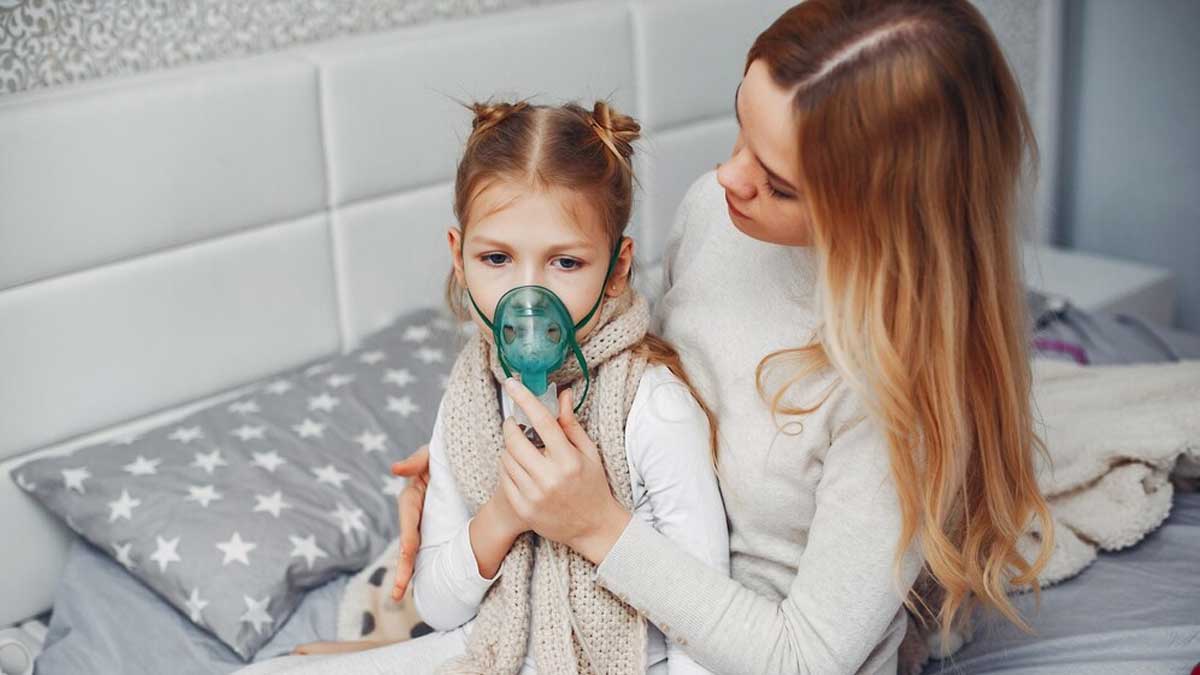
Pneumonia, an infection of the lungs can make it difficult for your child to breathe and cause chest pain, cough, and fever. It is an infectious disease which is more common in children less than five years old. To understand the danger signs of this health disease, we spoke to Dr Shuchin Bajaj, Founder and Director, Ujala Cygnus Group of Hospitals, who listed the same and shared management tips.
Table of Content:-

Pneumonia is a disease that typically results from an infection. It causes inflammation and congestion in the lungs, which reduces oxygen exchange and causes coughing and dyspnea, as stated in the Journal of Clinical Investigation. A cough or sneeze can transfer pneumonia through airborne particles, making it contagious. It can also spread from infected surfaces or by other fluids, such as blood after childbirth.
According to the World Health Organization (WHO), more than 7,25,000 children under the age of five die from pneumonia each year, with over 1,90,000 of those deaths occurring in newborns, who are especially susceptible to the illness.
Danger Signs Of Pneumonia

Dr Bajaj listed the signs of pneumonia as follows:
- Fast or Difficult Breathing: If your child is breathing rapidly, struggling to breathe, or using muscles around the ribs to breathe, it could be a sign of pneumonia.
- Persistent Cough: A cough that persists and worsens, especially if it produces phlegm or pus, may indicate pneumonia.
- Fever: High fever, particularly if it spikes suddenly, can be a warning sign of pneumonia.
- Bluish Tinge to Lips or Nails: This suggests a lack of oxygen and requires immediate medical attention.
- Chest Pain: Children may not express it clearly, but any indication of chest pain or discomfort should be taken seriously.
As per the WHO, fast breathing and breathing difficulties were the most frequently observed and experienced risk indicators, whereas fever was the most frequently reported danger sign among caregivers.
Also Read: Understanding How Pneumonia Impacts Children's Lungs
How to Take Care of Your Child with Pneumonia
If your child has pneumonia, follow these expert-recommended tips for taking care of your child:
- Seek Medical Attention: If you observe any danger signs or suspect pneumonia, consult a healthcare professional promptly.
- Ensure Proper Rest: Allow your child to rest to help their body recover.
- Hydration: Encourage frequent sips of water or clear fluids to prevent dehydration.
- Medication: Administer prescribed antibiotics as directed by the healthcare provider.
- Comfortable Environment: Keep the room warm and comfortable. Use a humidifier to add moisture to the air, aiding breathing.
- Monitor Symptoms: Regularly check your child's temperature and observe for any changes in symptoms.
- Follow-Up Care: Attend follow-up appointments as advised by the healthcare provider to ensure the infection is resolved.
Also Read: Pneumonia Among Diabetic Patients: What Are The Risk Factors One Should Know
Preventive Measures For Pneumonia

- Vaccination: Ensure your child is up-to-date with vaccinations, including those for pneumonia.
- Hand Hygiene: Emphasise proper handwashing to reduce the risk of infections.
- Avoid Smoke Exposure: Keep your child away from tobacco smoke, as it can increase the risk of respiratory infections.
- Healthy Lifestyle: Encourage a balanced diet, regular exercise, and adequate sleep to support overall immune health.
Bottomline
Dr Bajaj concluded, “It's essential to stay informed about pneumonia symptoms and seek medical attention promptly. Always follow your healthcare provider's advice for the best care of your child. In the case of a recent pneumonia outbreak, public health measures and recommendations from local authorities should also be closely followed.”
[Disclaimer: The information in this article is shared by a registered healthcare professional and is for informational purposes only. We advise you to consult with your doctor if your child experiences any health issues.]
Also watch this video
How we keep this article up to date:
We work with experts and keep a close eye on the latest in health and wellness. Whenever there is a new research or helpful information, we update our articles with accurate and useful advice.
Current Version